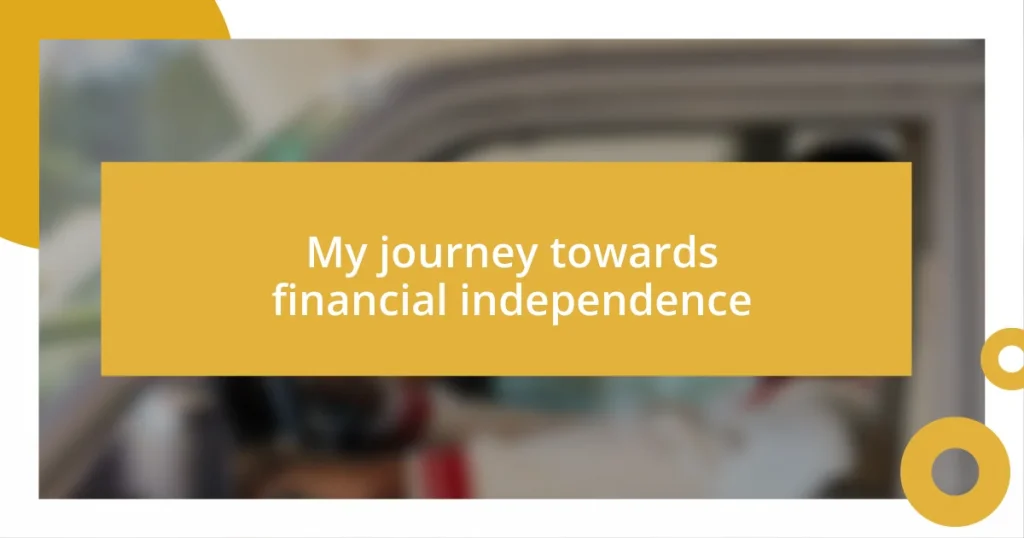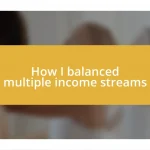Key takeaways:
- Financial independence is about aligning choices with personal passions and values, rather than just accumulating wealth.
- Setting SMART financial goals and creating a budget plan are crucial steps towards achieving financial independence.
- Developing multiple income streams and regularly tracking progress fosters financial security and enables adaptability to life’s unpredictability.
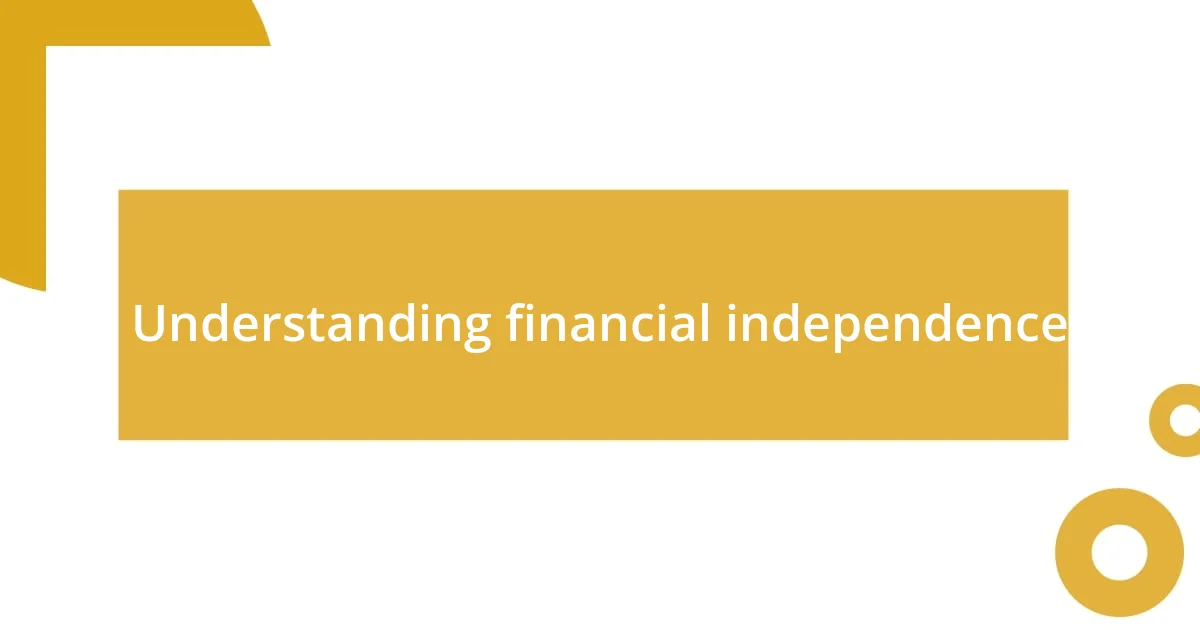
Understanding financial independence
Financial independence is often seen as the ultimate goal, but what does it truly mean? For me, it’s not just about having a substantial bank balance; it’s about having the freedom to make choices that align with my passions and values. I recall the moment I realized I could choose to work less and travel more, which sparked a transformative shift in my perspective on money.
During my own journey toward this independence, I faced numerous challenges and setbacks. There was a time when I felt overwhelmed by debt and uncertain if I could ever escape that cycle. It was then I began to understand that financial independence isn’t just about accumulating wealth—it’s about mastering your mindset and changing your relationship with money. Have you ever felt stuck in a financial rut? I’ve been there, and it’s essential to acknowledge where you are to envision where you want to go.
Another crucial insight I’ve gained is that financial independence is deeply personal and varies from person to person. For some, it might mean retiring early, while for others, it could simply mean having the ability to support their family or pursue a passion project. Reflecting on my own experiences, I’ve learned that the journey is about prioritizing what matters most to you, not just what society dictates. Are you prioritizing your desires, or are you influenced by external expectations? The truth is, understanding financial independence starts with defining what it means to you personally.

Setting clear financial goals
Setting clear financial goals is a fundamental step in my journey toward achieving financial independence. I remember when I first started; I was overwhelmed by the sheer number of potential paths I could take. I chose to break my goals down into smaller, manageable parts. This helped create a clear roadmap that ultimately led me to my financial aspirations.
Having specific targets, such as saving a certain amount each month or paying off debt by a particular date, provides a sense of direction. For example, I once set a goal to save for a dream vacation, which seemed distant at first. By calculating my expenses and setting aside a small amount each week, I was able to watch my savings grow, turning what felt like an impossible dream into a beautiful reality.
When you set clear financial goals, it’s crucial to make them SMART: Specific, Measurable, Achievable, Relevant, and Time-bound. This method doesn’t just help in planning; it keeps me motivated along the way. I still use this strategy today, constantly adjusting my goals as circumstances change, which helps me stay committed while enjoying the journey.
| Goal Type | Example |
|---|---|
| Short-term | Pay off credit card debt in 6 months |
| Medium-term | Save for a home down payment in 3 years |
| Long-term | Achieve a retirement fund of $1M by age 65 |

Creating a budget plan
Creating a budget plan was a game-changer for me on this journey. Initially, I had no idea where my money was going each month. Once I took the time to map out my income and expenses, everything became clearer. I vividly remember the relief I felt when I identified areas where I could cut back without sacrificing my quality of life.
Here’s how I structured my budget:
- List your income: All sources of income, including salaries, side hustles, or passive income.
- Detail your expenses: Fixed (rent, utilities) and variable expenses (eating out, entertainment).
- Set limits for each category: Allocate a specific amount to each expense category, being realistic but firm.
- Track your progress: Regularly review where you spent versus your budget to identify patterns.
- Adjust as necessary: Life happens, and adapting my budget was key to staying on track.
Revisiting my budget each month turned out to be empowering. In one instance, I found that I was spending significantly on coffee runs. Swapping these for the occasional home-brewed cup not only saved me money but also brought joy to my mornings as I crafted my own brews. Thinking about the little changes you can make can lead to big savings!

Building an emergency fund
Building an emergency fund felt like a daunting task at first, but I quickly realized how essential it was for financial security. Initially, I was tempted to splurge with any extra cash, but I learned that having a safety net would bring me peace of mind. I remember the exact moment when a friend shared a personal story about their unexpected car repairs; that conversation alone shifted my perspective. It made me ask myself: “What would I do in a similar situation?”
As I began to set aside a portion of my income each month, watching that fund grow brought me a sense of empowerment. I started small, contributing just a few dollars weekly, and celebrated each milestone. There was something incredibly satisfying about reaching my first thousand dollars—it felt like a solid foundation for my financial future. I often think about how just a few months into this process, I felt more in control of my life.
In my experience, a good rule of thumb is to aim for three to six months’ worth of living expenses in your emergency fund. This might sound intimidating, but I found it helpful to visualize this goal as layers of security. Have you ever thought about how it feels to know you’re prepared for the unexpected? For me, the freedom that came from building this fund was immensely liberating. It allowed me to focus on my long-term goals without the constant worry of unforeseen expenses. Plus, now I know that I’m ready for whatever curveballs life might throw my way!
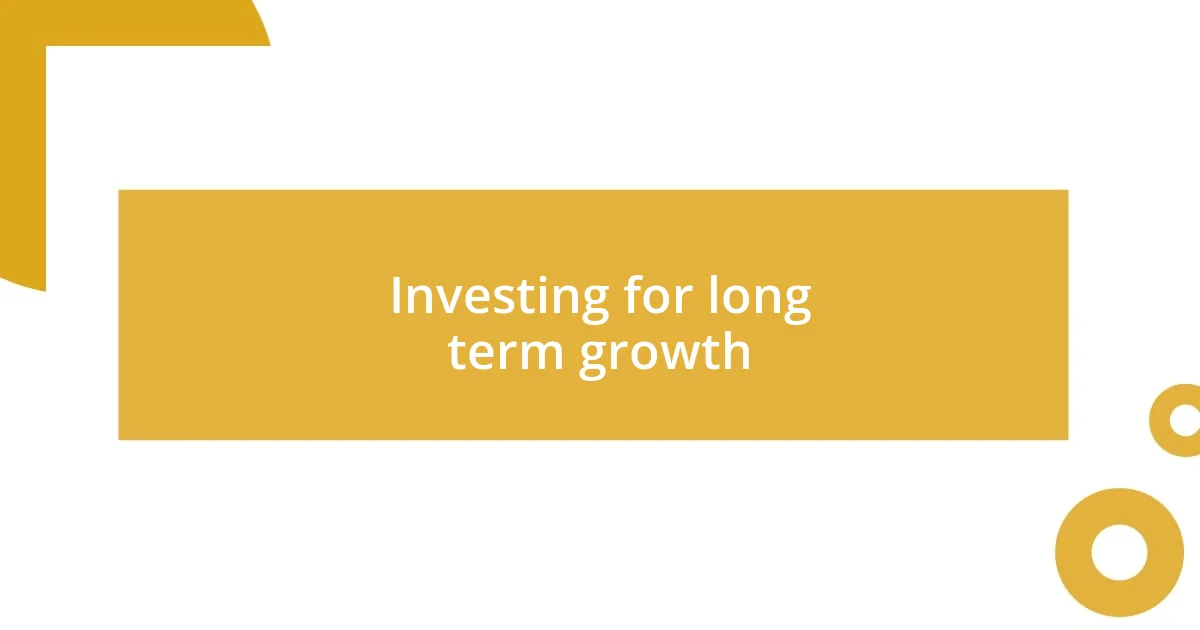
Investing for long term growth
Investing for long-term growth has been one of the most rewarding parts of my financial journey. I remember the first time I dipped my toes into the stock market; it felt both exhilarating and terrifying. I asked myself, “What if I lose everything?” but then realized that thinking long-term is crucial. Stocks might fluctuate daily, but historically, they’ve provided the potential for higher returns compared to other options, like savings accounts.
As I learned more about different investment vehicles, I found that a diversified portfolio was key. I decided to invest in a mix of stocks, bonds, and mutual funds, which helped me minimize risk. There was a moment when I saw my first significant return; it was like a burst of joy! That experience taught me the importance of being patient. Long-term investing isn’t about chasing quick wins; it’s about giving my investments time to grow and compound. Have you ever noticed how time can turn a small seed into a giant tree? That’s exactly how I see my investments now.
I also made it a point to regularly contribute to my retirement accounts. I recall sitting with a financial advisor who emphasized the benefits of starting early, and that really struck a chord with me. I realized that the earlier I started, the more my money could work for me through compound interest—essentially earning interest on interest. It made me wonder how many people miss out on this advantage simply because they wait too long to start investing. For me, committing to long-term growth was not just an investment in my future but also a promise I made to myself to build the life I wanted.

Developing multiple income streams
Developing multiple income streams has truly transformed my financial landscape. I remember the first time I considered side hustles; it felt like opening a door to a world of possibilities. Have you ever felt that initial rush when you realize there’s more than one way to earn? For me, it all started with freelance writing.
As I gradually expanded my efforts, I focused on my passions and skills. I explored options like teaching online classes and even creating printables to sell online. Each new income stream felt exhilarating, and I reveled in the empowerment that came with each paycheck. I once had a fantastic conversation with a fellow entrepreneur who said, “Why limit your earning potential to one source?” That question stuck with me and propelled me to embrace the idea of diversifying my income.
Reflecting on this journey, it’s clear that having multiple income streams not only provides financial security but also creates a safety net against life’s unpredictability. There was a time when an unexpected bill made me incredibly anxious, but knowing I had extra income flowing in alleviated that stress. Have you ever found yourself in a tight spot financially? For me, building these streams has been like adding layers to my financial fortress—each one reinforcing my ability to weather any storm.
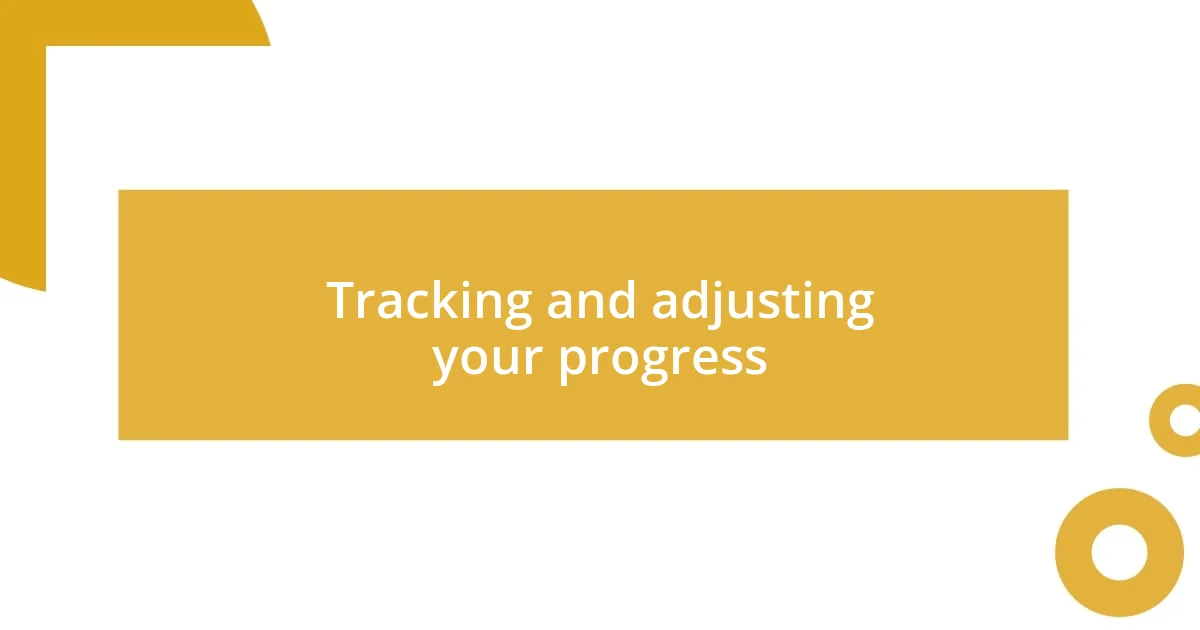
Tracking and adjusting your progress
Tracking my progress on the path to financial independence has been a game changer. Initially, I jotted down my expenses and savings in a simple spreadsheet, which felt almost therapeutic. Have you ever taken a moment to look at your financial habits? I found that visualizing my spending patterns revealed opportunities for improvement I hadn’t noticed before, like how much I spent on takeout.
As I gained confidence, I started using mobile apps to help me track my investments and monitor my net worth. I recall a time when I saw my portfolio drop unexpectedly; my heart sank. But instead of panicking, I used that moment to assess my strategy and make adjustments. It was all about understanding that fluctuations are part of the journey, not the end of it. With each update, I became more adept at tweaking my financial plan.
Regular reviews of my progress have become a vital part of my routine. I set aside time each month to reflect on my financial goals. It makes me feel empowered and in control. When I notice I’m straying from my targets, I ask myself what’s causing it. Is it my spending habits? Or am I perhaps a bit too lenient on myself? This kind of introspection not only keeps me aligned with my goals but also ignites a fire within me to pursue financial independence with even greater fervor.









